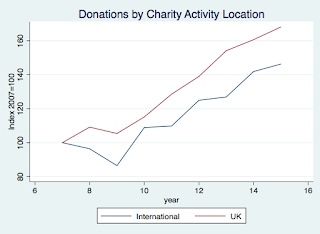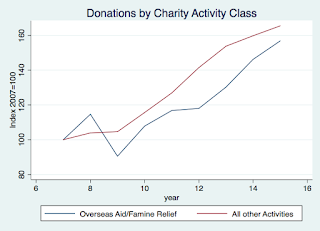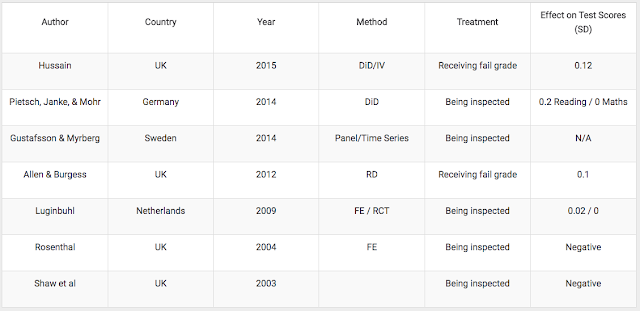30 March 2025
A research agenda on education & institutions
28 March 2025
Stop highlighting our differences? #moreincommon
"The thing is, we all have multiple identities: I’m tall, white, Oxford-educated, bald, heterosexual, male, bourgeois with a working class background, an economist, an atheist with a Methodist upbringing. And so on and on. The question is not: what are my identities? But rather: which of these identities matter?…Even if you accept biological essentialism, the question of which of our multiple identities becomes salient is surely in large part a social construct....No good can come from raising the salience of racial or ethnic identities."
"Through a series of cross-national statistical analyses, the authors find a robust association between enumeration of ethnic cleavages on the census and various forms of competition and conflict, including violent ethnic civil war”.
23 March 2025
The Political Economy of Public Sector Performance Management Reform
Reflections from Prajapati Trivedi, founding Secretary of the Performance Management Division in the Government of India Cabinet Secretariat, in Governance.
"The new government of Prime Minister Modi never formally declared that it is closing the RFD system. It simply stopped asking the departments to prepare RFDs (performance agreements). Indeed, the government went on to appoint three more Secretaries for Performance Management as my successors. The system was, however, allowed to atrophy and no formal answer about the status of the RFD system was either given in the Parliament in response to questions on the topic or was forthcoming under India's Right to Information (RTI) act. Thus, we can only speculate why the RFD system came to an abrupt end.
First, it is possible that the review of the working of the RFD system in the past 4 years by the incoming Modi government revealed a story that did not match their election rhetoric. Modi had portrayed the outgoing government of Singh as weak on governance and could not, therefore, acknowledge the existence of a rigorous system of performance monitoring and evaluation of government departments. After all, it had promised to do in its election manifesto what was already being done.
Second, the review of actual results for the performance of individual government departments perhaps revealed that “reality” of performance was better than the “perception.” It is fair to say that Manmohan Singh lost elections because he could not “talk the walk.” The performance data revealed that on average government departments were achieving 80% of the targets assigned to them via performance agreement (RFDs). By contrast, the opinion polls at the time revealed that the electorate rated the government performance at around only forty percent 40%. Thus, continuing the RFD system would have revealed facts that went against the main narrative on which the government of Modi came to power.
Third, it is possible that the new government found that the performance results for the past 4 years based on the departments' ability to meet agreed commitments did not meet their preconceived biases.
Fourth, a system based on ex ante agreements and objective evaluation of performance at the end of the year reduces discretion and was perhaps seen as inimical to the personalized style of management preferred by the incoming Prime Minister.
And fifth, I have yet to come across any workplace where performance evaluation is welcomed by staff. Senior career civil servants did feel the pressure to perform and were waiting to sow seeds of doubt in the minds of incoming administration. Performance management is a leadership issue and not a popular issue.
There are several key lessons of my experience that may be relevant for policy makers working on a similar system in their own countries.
We succeeded beyond our wildest expectations in terms of the scope and coverage of the performance management policy because we emphasized simplicity over complexity. We defined performance management as simply the ability of the department to deliver what it had promised.
It is my strong conviction that unless you can reduce the performance measurement to a score, it will remain difficult to grasp and hence difficult to sustain over time. For the performance score to be meaningful, however, performance management must be based on ex ante commitments and must cover all aspects of departmental operations.
Performance management is best implemented as a big-bang effort. Pilots in performance management do not survive because those departments chosen as pilots feel they are being singled out for political reasons.
Finally, the single biggest mistake of the outgoing government was to not enshrine the RFD policy in a law. A similar policy for accountability of state-owned enterprises in India was embedded in a law in 1991 and it has survived changes in government."
09 March 2025
Liberia Fact of the Day
"The treaties that govern space allow private individuals and corporations to travel the stars, but only with the licensure and legal backing of an earthbound government. It’s similar that way to the laws of the sea. And today, on Earth’s oceans, more than 11 percent of all the tons of freight shipped is carried on boats that fly the Liberian flag (In contrast, U.S.-registered ships carry just 0.7 percent of the freight tonnage).
In exchange for lower taxes and looser regulations, both the shipping companies of the present and the Martian explorers of tomorrow could pay to register their vessel with a small country they have no other connection to (Liberia earns more than $20 million a year this way) and carry its flag (and laws) with them, wherever they go."
The key to better education systems is accountability. So how on earth do we do that?
"For years the Bank and other international agencies have sought to give the poor a voice in health, education, and infrastructure decisions through channels unrelated to politics. They have set up school committees, clinic committees, water and sanitation committees on which sit members of the local community. These members are then asked to “oversee” the work of teachers, health workers, and others. But a body of research suggests that this approach has produced disappointing results."
- Student test scores (whether simple averages or more sophisticated value-added models)
- Professional judgement (e.g. based on lesson observations)
- Student feedback
"The current test based approach to accountability is far too narrow … has led to many unintended and negative consequences. It has narrowed the curriculum, induced schools and teachers to focus on what is being tested, led to teaching to the test, induced schools to manipulate the testing pool, and in some well-publicized cases induced some school teachers and administrators to cheat.
Now is the time to experiment with inspections for school accountability …
Such systems have been used extensively in other countries … provide useful information to schools … disseminate information on best practices … draw attention to school activities that have the potential to generate a broader range of educational outcomes than just performance on test scores … [and] treats schools fairly by holding them accountable only for the practices under their control …
The few studies that have focused on the single narrow measure of student test scores have found small positive effects."
"Like many of its American counterparts, Peterhouse Primary School in Norfolk County, England, received some bad news early in 2010. Peterhouse had failed to pass muster under its government’s school accountability scheme, and it would need to take special measures to improve. But that is where the similarity ended. As Peterhouse’s leaders worked to develop an action plan for improving, they benefited from a resource few, if any, American schools enjoy. Bundled right along with the school’s accountability rating came a 14-page narrative report on the school’s specific strengths and weaknesses in key areas, such as leadership and classroom teaching, along with a list of top-priority recommendations for tackling problems. With the report in hand, Peterhouse improved rapidly, taking only 14 months to boost its rating substantially."
This post appeared first on the RISE website.
05 March 2025
Rising DFID Spending hasn't Crowded Out Private Giving


02 March 2025
Introducing... the Global Schools Forum
The Global Schools Forum is supported by The Education Partnerships Group (EPG) @EPG_Edu, UBS Optimus Foundation @UBSOptimus, Pearson Affordable Learning Fund @AffordableLearn, and Omidyar Network @OmidyarNetwork.
14 February 2025
LSE on the UK gov’s new housing plans
"The fundamental problems with housing remain the same as in the last fifteen years and of those the most fundamental is the lack of land for development. Only fundamental reforms of our housing supply process will help and this proposes none. Indeed it in some ways goes backwards. It goes from a set of (not very good) mechanisms delivered in 2007 with the Regional Spatial Strategies to a set of aspirational gestures. Frankly the Secretary of State could build more houses with a magic wand."From the Spatial Economics Research Centre blog
03 February 2025
Cash-on-Delivery Aid for Trade Facilitation
"The UK can improve upon its existing Aid for Trade offer by making increased use of results-based programmes. “Cash-on-delivery” aid (paying for outcomes, not inputs) is most appropriate where local contextual knowledge matters, where the best combination of inputs is uncertain and local experimentation is needed, and where precise design features and implementation fidelity are most critical (see, for example, the discussion by Savedoff [2016] on energy policy). All of these criteria also apply to Aid for Trade.
A typical Aid for Trade programme might carry out an extended diagnostic project to identify the constraints to change, and then design and contract a project to address these constraints. The payments would typically be made for activities (for example, technical assistance for improving a certain process) that, according to a theory of change, should lead to the desired outcomes. But contracting for activities and inputs doesn’t allow for sufficient experimentation and change.
A better approach is to contract for outcomes (i.e., to offer cash on delivery) and allow those with the required information the flexibility to determine the best way of achieving those outcomes.
Common concerns around cash on delivery focus on exactly what outcomes are contracted for, how they are measured, and whether there is any risk of distortion of priorities according to what is measurable or gaming of indicators. Indicators should be quantifiable, ideally continuous (to allow for variable payment in proportion to the degree of progress), and independently verifiable. Another common concern is how governments might fund any up-front investment costs. Here, then, the proposal is not that cash on delivery should replace all aid, but simply that it replace a portion of aid in a piloted manner. Further, if the outcomes are focused on “soft” rather than “hard” infrastructure, these up-front costs should be limited.
With trade, contracts could be based on the World Bank’s ‘Doing Business’ indicators. We have reasonable econometric evidence (Hoekman and Nicita 2011) that these indicators of the cost of importing and exporting (in both time and money) are associated with greater volumes of imports and exports.
An alternative but similar set of possible indicators that could be used as outcomes for contracted payments are the OECD Trade Facilitation Indicators, which probe border procedures in more detail. Moïsé and Sorescu (2013) estimate that streamlining the costs represented by these indicators could reduce trade costs by 15 per cent for low- and lower-middle-income countries.
Rather than trying to tell a specific country how best to reduce that time and cost, we could instead just write a contract to pay a specified amount for each hour the country reduces the time it takes goods to clear the border and exporters and/or importers to comply with documentary requirements.
The potential gains to developing countries are high. The estimated gain to a low-income country from reducing its cost of exporting to that of a middle-income country is 2 per cent higher exports (Hoekman and Nicita 2011). For a typical low-income country, such as Malawi, with total annual exports of around US$1.5 billion, a 2 per cent increase would be worth US$30 million a year. The expenses associated with reducing export times would almost certainly cost less than this amount.
In summary, the UK could take the lead in applying a more innovative and potentially much more effective approach to Aid for Trade by using cash on delivery. It could be used as a complement to the other proposals in this note and, as a relatively new approach, could be established relatively promptly as a pilot."
25 January 2025
How to spend aid in fragile countries
24 January 2025
You don’t need to be a cosmopolitan to support more migration
New from Dani Rodrik:
"how strong a preference must we have for our fellow citizens relative to foreigners to justify the existing level of barriers on international labor mobility? More concretely, let φ stand for the weight in our social welfare function on the utility of domestic citizens relative to the utility of foreigners.
When φ=1, we are perfect cosmopolitans and we see no difference between a citizen and a foreigner. When φ→∞, foreigners might starve to death and we wouldn’t care.
For the policy in question [allowing the movement of 60 million workers from poor to rich nations] to reduce social welfare in the rich countries, it turns out that φ must be larger than 4.5. Is a welfare premium of 450 percent for fellow citizens excessive? Is it reasonable to think that a foreigner is worth less than 22 percent a citizen?"
17 January 2025
How the UK can lead the world on trade for development
10 January 2025
Experimental Conversations
When I was studying for my undergraduate degree, probably the most enjoyable book I read I think I happened to stumble across in the library (back in the day when you had to actually go to the library to find book chapters and physical copies of journals to read), called ‘Conversations with Leading Economists’. The conversational style, discussing in conversational language how ideas came about and how theorists interacted with each others' ideas and with data, was an amazing breath of fresh air, and a world away from the weirdness of the textbooks which often appear to pass down strange and seemingly grossly unrealistic theories and models of the world as if they were some kind of natural law. The list of interviewees includes Milton Friedman, Robert Lucas, Gregory Mankiw, Franco Modigliani, Paul Romer, Robert Solow.
That conversational style can probably be slightly more commonly found these days in the post-blogging social media world, but there are still plenty of important thinkers who don’t very frequently blog or write op-eds (they’re busy being important thinkers), so Timothy Ogden has provided the wonderful service of writing up a series of interviews with some of the leading voices in both academia and policy on the use of randomized evaluations and field experiments in development economics.

You can buy the book 'Experimental Conversations’ here.
21 December 2024
I miss being wrong
My favourite morning cycle commute podcast at the moment is probably the Ezra Klein show, and the Ta-Nehisi Coates interview is excellent. The podcasts are usually about an hour long, but perhaps in tribute to the 4.5 hour interview that Coates just did with Barack Obama, this particular episode is a glorious 1 hour 40 mins long. This is exactly what the unlimited space in the long tail of the internet is for.
There’s a good discussion near the end on the recurring Ezra Klein theme on changes in media and the death of blogging.
"Because nobody wants to hear it. I used to blog, as you used to blog. And blogging, as a form, is open to this real-time, ongoing learning process. That went away. But in addition to that, as your profile rises, people say you must have this high profile because you know, because you’re an authority."
That’s Ta-Nehisi. Ezra adds that for him podcasts are the new blogs, because the core of the death of blogging is in the inability to be wrong - and he feels more comfortable saying stuff off-the-cuff that might be wrong on the podcast than on the blog.
Clearly I’m a long way from the level of ability or prominence of either of these guys, but I don’t think I’m alone in blogging much less than I used to and really missing the habit. And I’m almost certainly not going to start a podcast. Perhaps then an early New Year resolution to start being more wrong?

